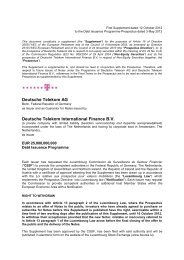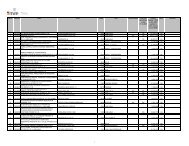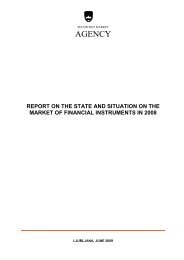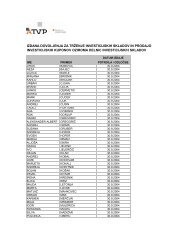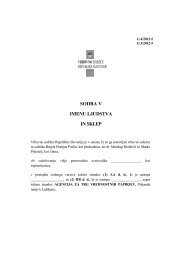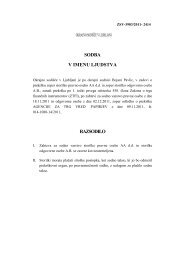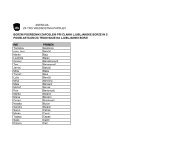estructuring program. Shared <strong>Services</strong> also includes Real Estate <strong>Services</strong> and DeTeFleet<strong>Services</strong>GmbH, a full-service provider of fleet management and mobility services.The principal subsidiaries of Deutsche Telekom AG are listed in the notes to the consolidated financialstatements as of and for the year ended 31 December 2011 in the section "Summary of accountingpolicies" under "Principal subsidiaries". In addition to Deutsche Telekom AG, 64 German and 174foreign subsidiaries are fully consolidated in Deutsche Telekom's consolidated financial statements asof and for the year ended 31 December 2011 (31 December 2010: 64 and 177). In addition, 10associates (31 December 2010: 13) and 7 joint ventures (31 December 2010: 5) are included usingthe equity method.Termination of Planned Sale of T-Mobile USA to AT&TOn 20 March 2011, Deutsche Telekom AG and AT&T entered into a purchase agreement (the "TMUSPurchase Agreement") for the sale of T-Mobile USA to AT&T. The Purchase Agreement provided fora purchase price of USD 39 billion, consisting of USD 25 billion in cash and approximately USD 14billion in AT&T common stock.The transaction was subject to approval by the U.S. Department of Justice ("DOJ") and the U.S.telecommunications regulatory authority, the FCC. After the DOJ had filed suit to block the transactionin the U.S. District Court for the District of Columbia in August 2011, and the U.S. authorities took aclear stance against the deal, AT&T and Deutsche Telekom terminated the TMUS PurchaseAgreement on 19 December 2011. Following this decision, Deutsche Telekom now reports the assetsand liabilities of T-Mobile USA as a continuing operation effective 20 December 2011.AT&T compensated Deutsche Telekom in line with the provisions of the TMUS Purchase Agreement.The compensation consists of the following components:• Payment of a break-up fee of EUR 2.3 billion (USD 3 billion) in 2011;• The right to the transfer to T-Mobile USA of Advanced Wireless Service spectrum licenses worthEUR 0.9 billion (USD 1.2 billion), contingent upon regulatory approvals; and• An agreement running for more than seven years which allows the provision of voice and dataUMTS roaming services within the United States.For further information, please refer to "Development of Deutsche Telekom's Business" and the notesto Deutsche Telekom's consolidated financial statements as of and for the year ended 31 December2011, incorporated by reference into this <strong>Prospectus</strong>.Corporate TransactionsOn 6 June 2011, Deutsche Telekom was informed that the Hellenic Republic, pursuant to the SharePurchase Agreement of May 2008 had made use of its right to sell another 10% of the shares in OTEto Deutsche Telekom. The purchase price determined, according to the Share Purchase Agreement,for approximately 49 million OTE shares was EUR 0.4 billion. Following the transfer of the shares asof 11 July 2011, the Hellenic Republic directly and indirectly holds approximately 10% of OTE, whileDeutsche Telekom's ownership stake has increased to 40%.On 7 October 2011, Deutsche Telekom announced the launch of BUYIN, its procurement joint venturewith France Télécom-Orange. Through BUYIN, Deutsche Telekom and France Télécom-Orange arecoordinating its procurement of terminal devices, mobile communications networks, and significantportions of fixed-network equipment and service platforms. In addition, the two companies intend tolaunch pilot projects to explore other areas for inclusion in the joint venture at a later stage, includingIT infrastructure and other IT areas.On 30 December 2011, OTE signed an agreement with Telekom Srbija for the sale of all shares heldby OTE in Telekom Srbija. Consequently, the value of these shares was shown as held for sale as of31 December 2011. The carrying amount of the stake was increased to a fair value of EUR 0.2 billionas of 31 December 2011 as a result of a purchase offer, recognised in total other comprehensiveincome. The sale closed on 25 January 2012. Proceeds of EUR 0.4 billion from the sale were paid toOTE in January 2012. As a result, profit (after taxes) of EUR 0.2 billion will be included in profit/lossfrom financial activities. After deduction of non-controlling interests, an amount of EUR 0.1 billion willbe included under profit attributable to owners of Deutsche Telekom (net profit) in the 2012 financialyear.50
In February 2011, T-Mobile Czech Republic and Telefónica O 2 CZ signed a 3G network sharingagreement. This agreement currently relates to the provision of high-speed mobile Internet to areaswithout broadband coverage in the Czech Republic. In July 2011, PTC and PTK Centertel signed anagreement for the shared use of their radio access networks and established the NetWorks! jointventure, which started operations on 1 September 2011. The joint venture agreement covers themanagement, planning, service, development and maintenance of the shared networks and is focusedon improving network quality, coverage and service.In December 2011, a binding national roaming agreement was concluded between T-Mobile Austriaand Hutchison 3G. One component of the agreement is the use by Hutchison of Deutsche Telekom's2G mobile communications network. The other is that Deutsche Telekom can use Hutchison's 3Gmobile communications network in rural areas. Under this agreement, Deutsche Telekom's customersacross Austria benefit from Hutchison 3G's fast UMTS network.Markets and RegulationThe Telecommunications MarketDeutsche Telekom's business in 2011 was affected by strong competition, saturated markets andintensified regulatory intervention, which resulted in price erosion.Ongoing stress in financial markets and more broadly in the global economy had an adverse effect onthe markets in which Deutsche Telekom operates. A slight increase in consumer demand in most ofthe core countries was only able to support the telecommunications market to a limited extent. Incountries where purchasing power dropped, the telecommunications market experienced an ongoingslowdown. As a result of strong pressure to consolidate national budgets, some countries, includingHungary, continued to impose taxes on telecommunications companies in 2011 or introducedadditional taxes, such as a real estate tax in Greece. Additionally, regulation caused mobiletermination rates in Europe to decrease significantly, resulting in more stress on operators in thetelecommunications market.Furthermore, the telecommunications market has undergone significant changes in recent years asmore households have given up fixed-network access lines altogether. This trend is particularly high inCentral and Eastern Europe, in part due to the comparatively poor condition of the fixed-networkcompared to Western Europe. In Germany, for example, customers have largely continued to keeptheir fixed-network access lines, with a much lower percentage of households exclusively using mobilephones.GermanyTotal revenue from telecommunications services has been declining since 2005, due primarily tointense competition and regulatory price reductions. Revenue from telecommunications services(mobile and fixed network) in Germany decreased by EUR 0.5 billion to around EUR 60.3 billion in2011. The main reason for the EUR 0.3 billion decline in mobile communications revenues was the50% reduction in termination rates mandated by the regulator. Revenue from the traditional fixednetworkbusiness declined by EUR 0.3 billion, while revenue at cable network operators increased byEUR 0.1 billion.Overall, prices for telecommunications services (mobile and fixed-network) decreased by 2.7%compared to 2010. Prices for fixed-network and Internet services declined by 2.4%, while prices formobile voice and data connections were down 3.5%.With around 38 million lines, the fixed-network market in Germany remained nearly stable in 2011.The use of lower-priced connections, such as call-by-call, continues to decline, a result of theincreasing use of bundled telecommunications services and flat rate packages from other suppliersand Deutsche Telekom's own flat rate offerings. Deutsche Telekom's competitors are increasinglybuilding their own infrastructure and implementing their business models, which has a growing impacton competition in the wholesale market. Deutsche Telekom expects consolidation to continue in theyears to come, particularly in the cable market, as well as new partnerships to be formed amongcompetitors.The number of broadband connections continues to grow overall, as approximately 1.2 million newconnections were added in 2011 (0.4 million by telecommunications providers and 0.8 million by cableoperators). These additions resulted in a total of 23.5 million DSL connections and around 3.6 million51
- Page 1 and 2: Debt Issuance Programme ProspectusD
- Page 3 and 4: Responsibility StatementDeutsche Te
- Page 5 and 6: to form and content, and all rights
- Page 7 and 8: Maturities:Form of Notes:Fixed Rate
- Page 10 and 11: Summary in respect of Risk FactorsR
- Page 12 and 13: Notes may not be a suitable investm
- Page 14 and 15: Internationalisation and Sustainabi
- Page 16 and 17: German Translation of the SummaryDi
- Page 19 and 20: Besteuerung:Vorzeitige Rückzahlung
- Page 21 and 22: Zusammenfassung der RisikofaktorenZ
- Page 23 and 24: Zusammenfassung der Risikofaktoren
- Page 25 and 26: Unternehmen aus diesem Grund zusamm
- Page 27 and 28: Risk FactorsProspective investors s
- Page 29 and 30: markets. These developments could,
- Page 31 and 32: consumer regulation at the federal
- Page 33 and 34: Existing mobile substitution effect
- Page 35 and 36: exacerbated by the global economic
- Page 37 and 38: are subject to several individual l
- Page 39 and 40: While Deutsche Telekom believes tha
- Page 41 and 42: exposed to the risk of an unfavoura
- Page 43 and 44: principal under such Notes may even
- Page 45 and 46: Statement of cash flows (page 9 in
- Page 47 and 48: otherwise agreed between the Issuer
- Page 49: DESCRIPTION OF BUSINESSGroup Organi
- Page 53 and 54: 2010. The demand for ever-faster da
- Page 55 and 56: Special Requirements Applicable to
- Page 57 and 58: Local Loop AccessDeutsche Telekom h
- Page 59 and 60: Incumbent network operators are obl
- Page 61 and 62: (e.g., avoid disclosure or blocking
- Page 63 and 64: PTC as Deutsche Telekom clarified t
- Page 65 and 66: combinations of businesses where De
- Page 67 and 68: For more information on the effects
- Page 69 and 70: • Other operating expenses increa
- Page 71 and 72: 345Includes expense relating to a c
- Page 73 and 74: investment levels to remain approxi
- Page 75 and 76: products and technologies, these in
- Page 77 and 78: Reconciliation of Net Debt31 Dec. 2
- Page 79 and 80: Deutsche Telekom's cash outflows fo
- Page 81 and 82: 1In addition to the fixed-network l
- Page 83 and 84: Development of Operations2011 2010
- Page 85 and 86: to upgrade its mobile network, prov
- Page 87 and 88: Czech Republic. Deutsche Telekom ha
- Page 89 and 90: decrease mobile termination rates,
- Page 91 and 92: The decrease in adjusted EBITDA in
- Page 93 and 94: In 2011, the United States operatin
- Page 95 and 96: The increase in total revenue in 20
- Page 97 and 98: solutions. It also manages and deve
- Page 99 and 100: In 2010, T-Systems substantially ex
- Page 101 and 102:
2011 2010 Change ChangeOf which: Vi
- Page 103 and 104:
conditions for additional capital m
- Page 105 and 106:
For additional information on the c
- Page 107 and 108:
Employees in the Group 31 Dec. 2011
- Page 109 and 110:
Civil servants employed by Deutsche
- Page 111 and 112:
Selected Financial InformationDeuts
- Page 113 and 114:
(Vorlagebeschluesse) with respect t
- Page 115 and 116:
Court of Justice annulled these jud
- Page 117 and 118:
having to pay license fees and comp
- Page 119 and 120:
Civil ServantsIn November 2004, Ger
- Page 121 and 122:
majority holdings by 2 May 2015, on
- Page 123 and 124:
Group Accounting manages the proces
- Page 125 and 126:
Deutsche Telekom International Fina
- Page 127 and 128:
Statement of comprehensive incometh
- Page 129 and 130:
Terms and ConditionsThis Series of
- Page 131 and 132:
"Global Note" means [the/any] [Temp
- Page 133 and 134:
interest shall continue to accrue o
- Page 135 and 136:
7 February 1992), the Amsterdam Tre
- Page 137 and 138:
Period is a day other than the 30th
- Page 139 and 140:
[in the case of Definitive Notes in
- Page 141 and 142:
([4]) of this § 6.](b)Notice of re
- Page 143 and 144:
of Stock Exchange], a Paying Agent
- Page 145 and 146:
(f)(g)the Issuer [in the case of No
- Page 147 and 148:
§ 14[(5)] to the Agent. Such notic
- Page 149 and 150:
Garantin] noch der Fiscal Agent ode
- Page 151 and 152:
Bei Rückzahlung oder Zahlung einer
- Page 153 and 154:
(b)Fällt ein Zinszahlungstag auf e
- Page 155 and 156:
[Sofern eine andere Methode der Bes
- Page 157 and 158:
[im Falle von Actual/360: die tats
- Page 159 and 160:
Für diese Zwecke bezeichnet "Zahlt
- Page 161 and 162:
Eine solche Kündigung darf allerdi
- Page 163 and 164:
(i)[Referenz-Preis einfügen] (der
- Page 165 and 166:
[(e)(f)von einer Zahlstelle abgezog
- Page 167 and 168:
(b)(c)(d)die Nachfolgeschuldnerin a
- Page 169 and 170:
eine vertretungsberechtigte Person
- Page 171 and 172:
(d)(e)(f)(iii)(iv)(v)(vi)by reason
- Page 173 and 174:
Non-binding translation of the Guar
- Page 175 and 176:
ganz oder teilweise in irgendeiner
- Page 177 and 178:
Tag der Begebung: [ ]These are the
- Page 179 and 180:
CURRENCY, DENOMINATION, FORM AND TI
- Page 181 and 182:
INTEREST (§ 4) 8ZINSEN (§ 4)o Fix
- Page 183 and 184:
oooooo ISDA Determination 9ISDA-Fes
- Page 185 and 186:
Instalment Amount(s)Rate(n) [ ]Earl
- Page 187 and 188:
GOVERNING LAW (§ 14)ANWENDBARES RE
- Page 189 and 190:
German Securities Code [ ]Deutsche
- Page 191 and 192:
Umfassende Erläuterung darüber, w
- Page 193 and 194:
Various categories of potential inv
- Page 195 and 196:
Commissions 29ProvisionenManagement
- Page 197 and 198:
Die Emittentin hat die Informatione
- Page 199 and 200:
Payment of the flat income tax will
- Page 201 and 202:
Kingdom of the Netherlands.Where th
- Page 203 and 204:
ResidentsAccording to the law of 23
- Page 205 and 206:
(c)account or benefit of, U.S. pers
- Page 207 and 208:
4. United KingdomEach Dealer has re
- Page 209 and 210:
Names and AdressesIssuersDeutsche T
- Page 211:
2010 2010PricewaterhouseCoopers Akt




